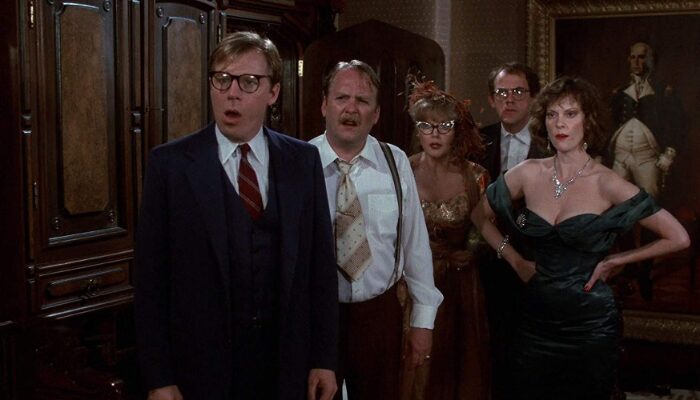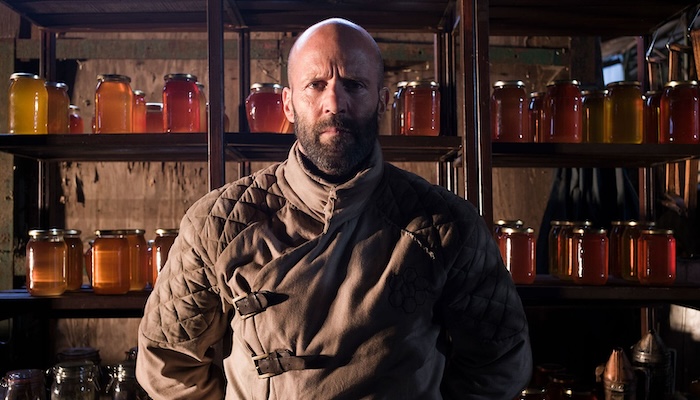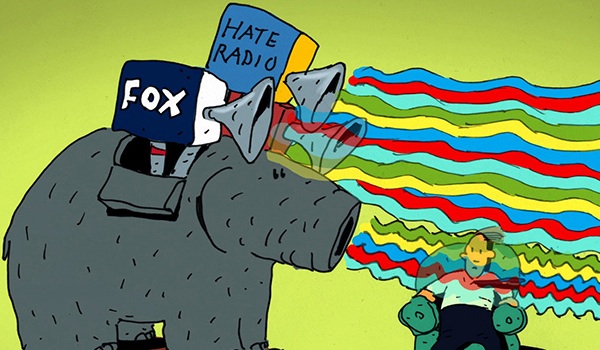Film Review: THE BRAINWASHING OF MY DAD (2015): A Mirror Image Of That Which It Criticizes
The Brainwashing of My Dad (2015) Film Review, a movie directed by Jen Senko, and starring Matthew Modine, Jen Senko, Frank Senko, Noam Chomsky, Jeff Cohen, Steve Rendall, Eric Boehlert, George Lakoff, and Edward S. Herman.
Before we start, this reviewer would like to inform readers that he considers himself a member of the political right (albeit more of the libertarian variety than the conservative variety). In an ideal world, indeed, in the one which Jen Senko’s The Brainwashing of My Dad ostensibly yearns for, such a disclosure would be unnecessary, as it would be taken for granted that dissenting opinions were honest, if not always perfect, assessments rather than underhanded attempts to belittle others’ political agendas and advance one’s own. Regrettably, this is not the world we live in, and just as regrettably, The Brainwashing of My Dad does not see fit to extend this courtesy to either viewers or those with opposing views, of whom the film is about.
Despite the movie’s title, Senko’s father Frank figures relatively little in the grand scheme of things. The story of his much-ballyhooed transformation from a “nonpolitical” or “Kennedy Democrat” (terms that might appear clear cut at first glance, but in serious need of further analysis upon the second) to a vicious “Right-Wing (their caps, not mine. The film could have used all caps like HYDRA from the Captain America movies and the effect would have been the same) fanatic.” While Jen and the rest of her family are shocked by Frank’s evolution, others might not be so surprised that, to return to the phrase “Kennedy Democrat”, someone who once supported a pro-gun, anti-communist, tax-cutting president would later emerge as a vocal conservative.
This doesn’t account for the unpleasant way Frank went about expressing his views of course, which is what the film is purportedly most troubled by. Indeed, it departs for extended periods of time from the titular brainwashing of Senko’s dad to chronicle what Hillary Clinton (hardly an objective source) referred to as a “vast right wing conspiracy” that’s been decades in the making and is now responsible for much of our nation’s current ills. It’s the sort of thing that the film would laugh off as a conspiracy theory if, say Fox News made a documentary of with the roles switched, but hey, unbiased people like Media Matters founder David Brock, Media Matters contributor Steve Rendall, and Carol Wallin, a member of Stop Rush (as in Limbaugh, not the band), say it’s true, so it must be. Speaking of ill-supported narratives, the movie interviews Edward S. Herman, who is renowned for his work on the propaganda model of media criticism with anarchist philosopher and fellow interview subject Noam Chomsky but remarkably less so for his, to put it gently, contrarian takes on the genocides in Rwanda and Bosnia. True, his stance on these issues doesn’t discredit the main point of the documentary, but one can’t help but notice the irony of lamenting ideologues pushing false narratives whilst seeking the opinion of someone whose views other academics have characterized as genocide denial.
None of this is to say that the media outlets and personalities excoriated in the movie are free of bias and not guilty of some (or many) of the distortions they are charged with. In fact, if it focused more on said distortions, as innumerable exposes and documentaries have done, viewers would be able to understand why the filmmakers are so concerned about the conduct of Fox News and others’ of it’s ideological ilk. But within the hour and 29 minutes spent lambasting the “Right-Wing,” we are never offered an example of legitimate or otherwise respectable right-wing media or personalities. If the problem really were one of civility and truth in media, then one would expect the documentary to send well-meaning conservatives who frown upon the sensationalism and inaccuracy of talk radio and chain emails in the direction of more responsible right-wing sources. With this in mind, the omission of any such sources provides insight into what the filmmakers probably think of credible conservatism: that’s there’s no such thing.
After hearing the oh-so-worried talking heads, watching the colorful animation, and seeing the shocking but often contextless statistics, it wouldn’t be surprising if viewers came away with the impression that right wingers were not people with principled or at worst ill-informed policy differences but foot soldiers in an army of mindless troglodytes waiting for the signal to turn off their TVs and radios and goose step into the streets and onwards to Washington D.C. We hear that the wacky John Birch Society ruined their preferred candidate Barry Goldwater’s shot at the presidency when it emerged that they accused Republican president Dwight D. Eisenhower of being a communist, but the film never tells us that it was William F. Buckley, the loquacious founder of the eminently conservative National Review and host of Firing Line who maddeningly enough appears in a still image without so much as being identified, who led the charge against the Birchers and purged them from the ranks of the respected right. It lumps in the libertarian Cato Institute with more traditional conservative think-tanks as proof of an insidious plot to expose Americans to reactionary thought (chilling!), but it doesn’t mention that any number of the Institute’s scholars have openly advocated on behalf of gay rights, immigration reform, and drug legalization and against corporate welfare, police militarization, and the Iraq war, positions not commonly found on the right. This alone should clue viewers into the fact that the story, to say nothing of the political right itself, is much more nuanced than they think, but unfortunately it does not seem the filmmakers think so.
In short, the main flaws of the movie lie not what it presents but in what it omits. While the interview subjects say Rush Limbaugh makes stories up out of thin air, the filmmakers highlight stories and information that seemingly prove their thesis but neglect information that contradicts or otherwise doesn’t support their premise. Instead of showing how dishonest, emotion-driven media made a family member demonize people with different views, the movie engages in the fear-mongering it accuses Fox of and inspires panic about a modern-day Brown Scare. It’s not lying per se, but it’s hardly any better, especially for a documentary about media manipulation. If Chomsky and Herman’s propaganda model really is at work in The Brainwashing of My Dad, it’s not in the way the filmmakers’ think it is.
Rating: 4/10
Leave thoughts on this review below in the comments section. For more The Brainwashing of My Dad news, photos, videos, and information, visit our The Brainwashing of My Dad Page, and consider subscribing to us by Email, “following” us on Twitter, Tumblr, Google+ or “liking” us on Facebook for quick updates. The Brainwashing of My Dad is currently available for viewing on iTunes, GOOGLE PLAY, and VUDU.
Related Articles
FilmBook's Newsletter
Subscribe to FilmBook’s Daily Newsletter for the latest news!












